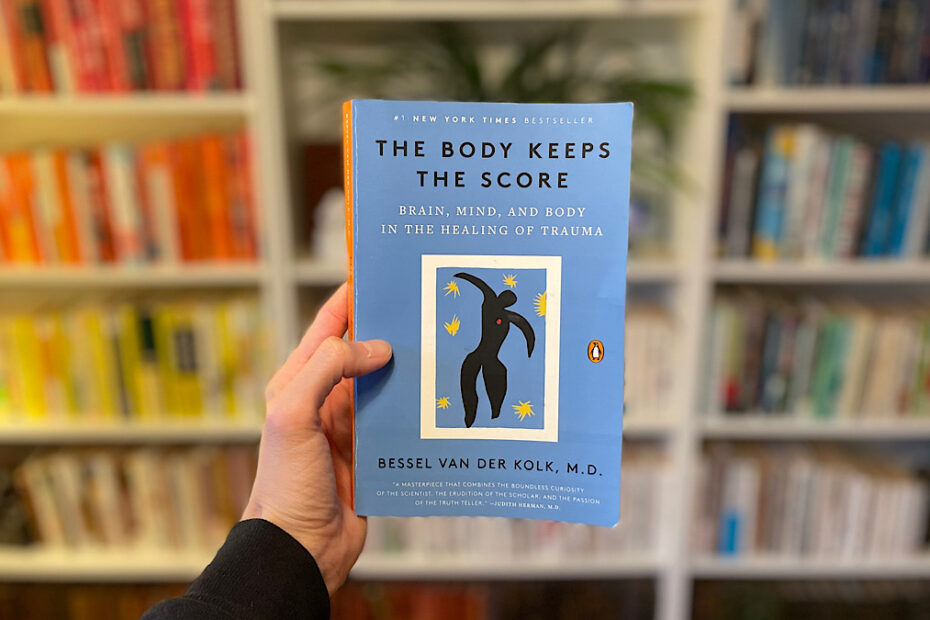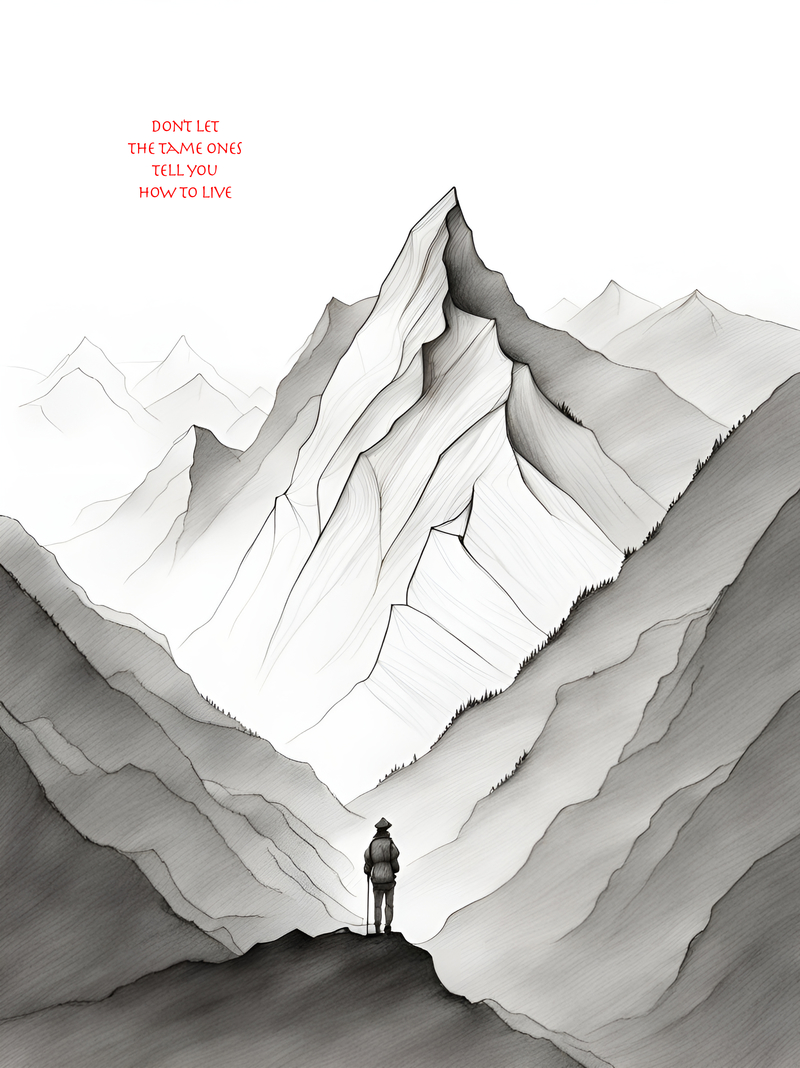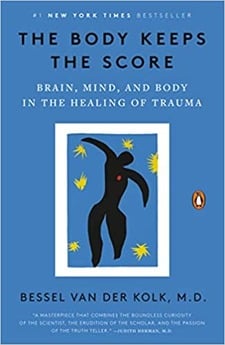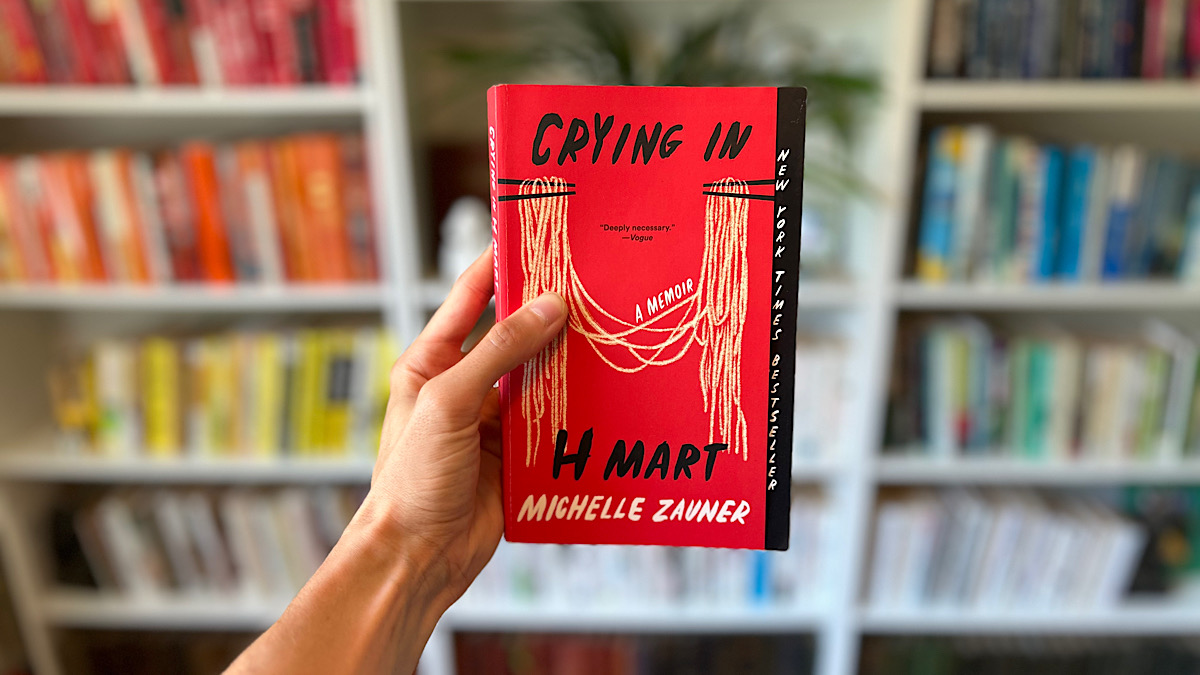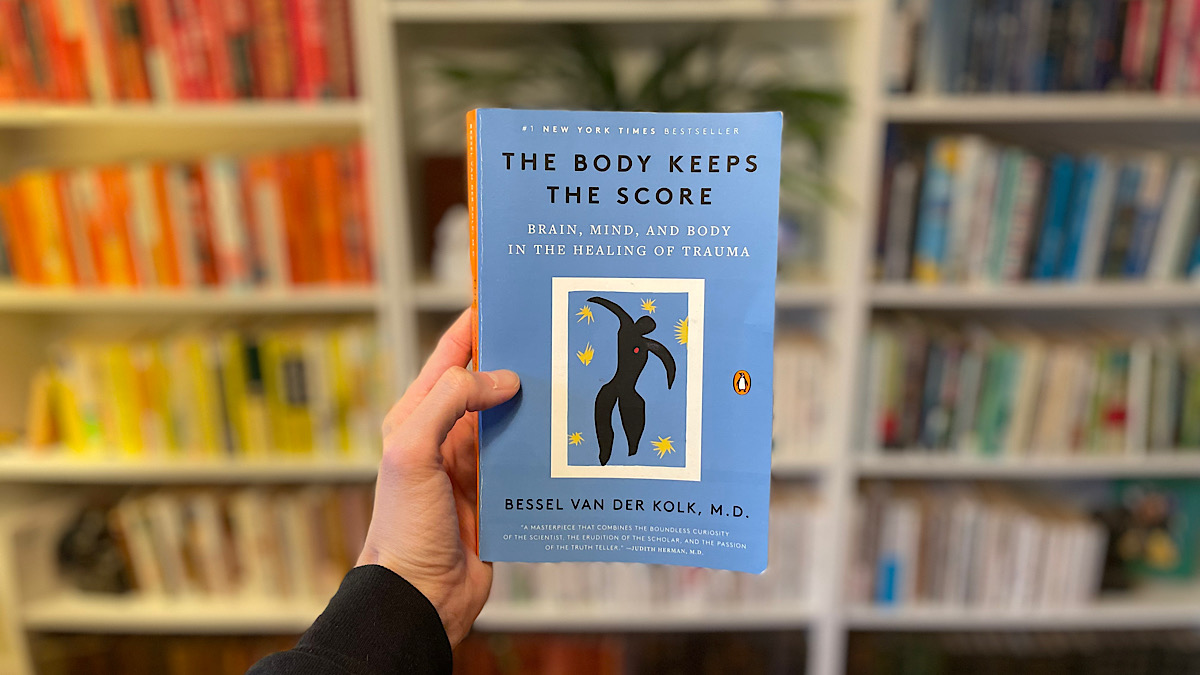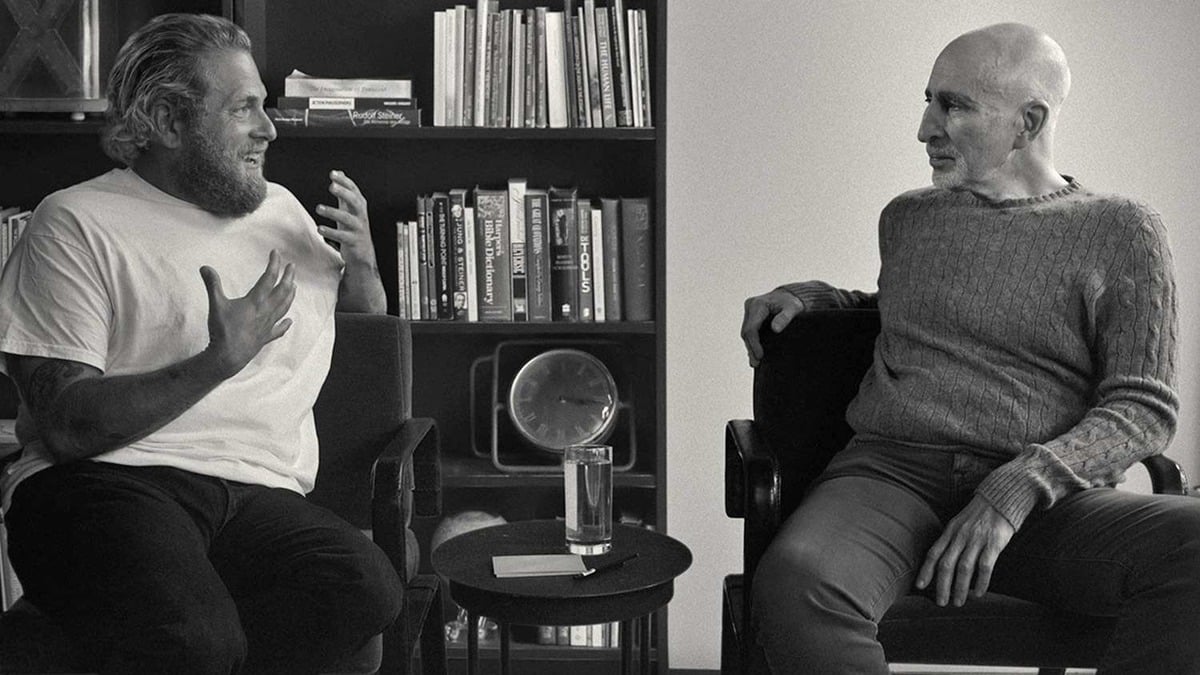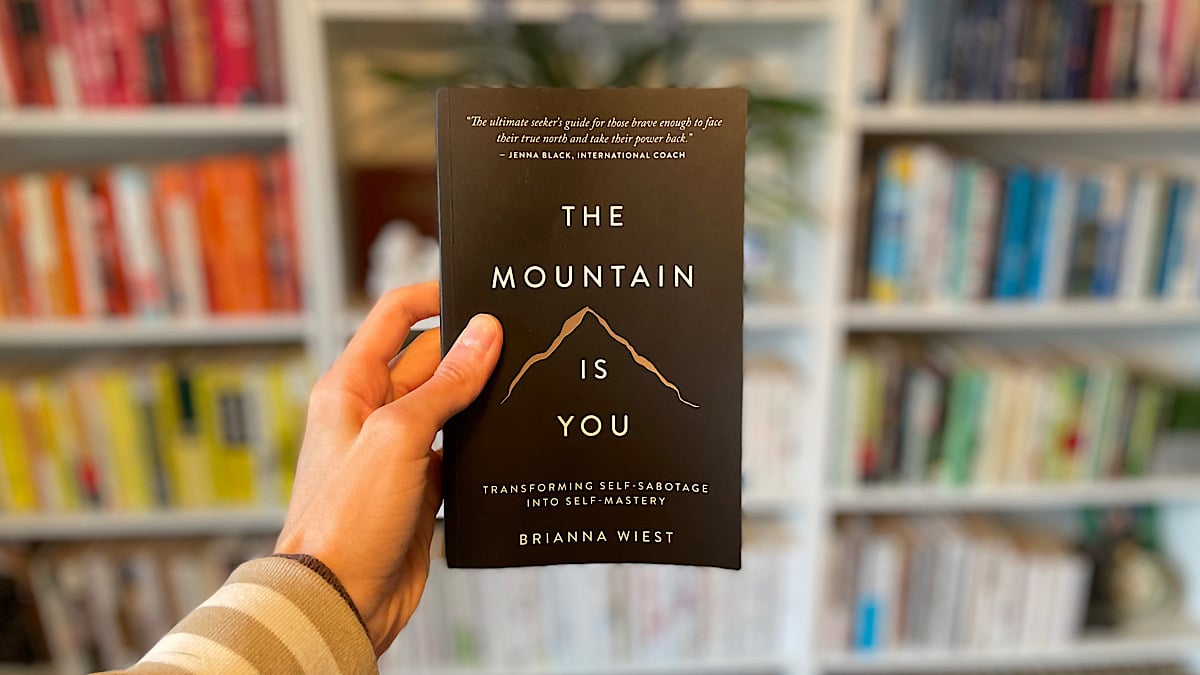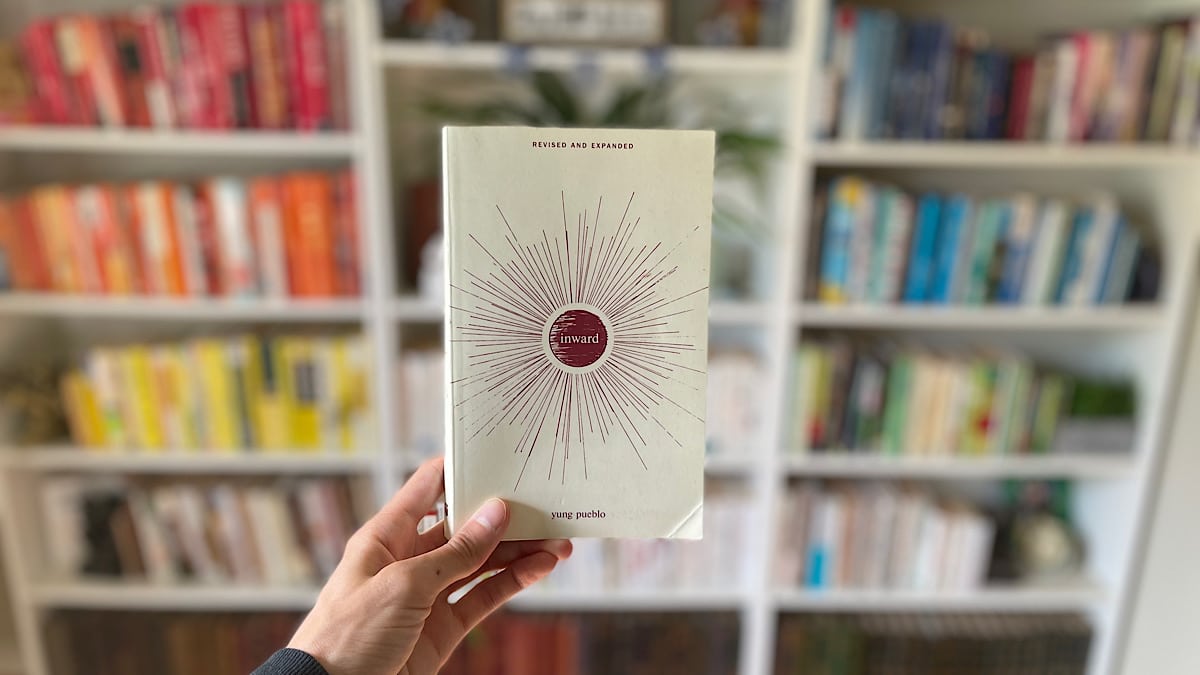Excerpt: A deeply insightful collection of quotes on trauma and healing from one of the world’s foremost experts on trauma, Bessel van der Kolk.
Click Here to jump right to our list of quotes on trauma!
Introduction: The Weight Of Heaviness
Heaviness doesn’t get lighter with time—it gets heavier.
You might try to trick your mind into ignoring, suppressing, or avoiding its heaviness—but that doesn’t change it’s weight. It only increases the time you’re holding it for.
Which, counterproductively, makes it heavier.
Hard conversations might be avoided, but they carry on within your mind—until they’re finally had.
Trauma might be suppressed, but only to the pit of your stomach—until it finally demands the attention it needs.
You might cleverly distract your mind from facing your toughest problems, but as soon as you’re no longer distracted, there they are.
NEW In The Shop: Don’t Let The Tame Ones Tell You How To Live [Poster]
Why We ♥ It: Some of the best advice I (Matt here) ever got was: don’t take life advice from people who aren’t living a life you want to live and don’t take criticism from people you wouldn’t go to for advice. I created this poster to act as a reminder to listen more closely to our role models and less closely to our critics, trolls, and tamed-comfort-zone-hugger acquaintances. It’s also a perfect gift for the outdoor adventurer, travel enthusiast, or solo explorer (or soon to be). Available in print or digital download. 👇🏼
...Want to advertise your book, product, or service? Send inquiries to matt@movemequotes.com.
Want to lighten your load? Face the heaviness. Have the hard conversation. Confront the trauma. Face the tough problems.
Maybe not all at once. And certainly not all in one day. But, at minimum… turn towards it. Look at it. Sit with it. Breathe with it.
And if you can’t do that… find someone who you can do it with. A trusted friend. A close family member. A professional who has devoted their life to doing precisely that.
Below, you’ll find our collection of quotes on trauma and healing from exactly this type of professional. Bessel van der Kolk, one of the world’s foremost experts on trauma, who has spent over three decades working with survivors, shares some of his insights into this type of matter, captured from his book, The Body Keeps The Score.
I have split the quotes into five distinct sections (click to jump):
- Quotes on Understanding Trauma and First Steps Towards Healing
- Quotes on The Importance of Social Support for Healing Trauma
- Quotes on Writing / Therapy / and Drugs for Healing Trauma
- Quotes on Trauma Education
- Reflective Quotes on Trauma from the Author
As you read the quotes you’ll find page numbers and links to his book for further reading on the topics discussed. Emphasis added is my own.
It takes a lot of energy to carry around heaviness. And carrying around heaviness only gets heavier as time goes on because our carrying muscles only continue to fatigue.
But, when you face it, while it might be heavy upfront, you can finally free yourself from the increased heaviness that comes with time. My hope is that you might take a step in this direction, today, after reading these deeply insightful quotes from Dr. van der Kolk. I hope they find you well.
10 Quotes on Understanding Trauma and First Steps Towards Healing
“Nobody can ‘treat’ a war, or abuse, rape, molestation, or any other horrendous event, for that matter; what has happened cannot be undone. But what can be dealt with are the imprints of the trauma on body, mind, and soul: the crushing sensations in your chest that you may label as anxiety or depression; the fear of losing control; always being on alert for danger or rejection; the self-loathing; the nightmares and flashbacks; the fog that keeps you from staying on task and from engaging fully in what you are doing; being unable to fully open your heart to another human being.”
Bessel van der Kolk, The Body Keeps The Score (Page 205)
“Trauma is not just an event that took place sometime in the past; it is also the imprint left by that experience on mind, brain, and body. This imprint has ongoing consequences for how the human organism manages to survive in the present.”
Bessel van der Kolk, The Body Keeps The Score (Page 21)
“Trauma results in a fundamental reorganization of the way mind and brain manage perceptions. It changes not only how we think and what we think about, but also our very capacity to think. We have discovered that helping victims of trauma find the words to describe what has happened to them is profoundly meaningful, but usually it is not enough. The act of telling the story doesn’t necessarily alter the automatic physical and hormonal responses of bodies that remain hypervigilant, prepared to be assaulted or violated at any time. For real change to take place, the body needs to learn that the danger has passed and to live in the reality of the present.”
Bessel van der Kolk, The Body Keeps The Score (Page 21)
“In order to regain control over your self, you need to revisit the trauma: Sooner or later you need to confront what has happened to you, but only after you feel safe and will not be retraumatized by it. The first order of business is to find ways to cope with feeling overwhelmed by the sensations and emotions associated with the past.”
Bessel van der Kolk, The Body Keeps The Score (Page 206)
“Trauma victims cannot recover until they become familiar with and befriend the sensations in their bodies. Being frightened means that you live in a body that is always on guard. Angry people live in angry bodies. The bodies of child-abuse victims are tense and defensive until they find a way to relax and feel safe. In order to change people need to become aware of their sensations and the way that their bodies interact with the world around them. Physical self-awareness is the first step in releasing the tyranny of the past.”
Bessel van der Kolk, The Body Keeps The Score (Page 103)
“Trauma robs you of the feeling that you are in charge of yourself. The challenge of recovery is to reestablish ownership of your body and your mind—of your self. This means feeling free to know what you know and to feel what you feel without becoming overwhelmed, enraged, ashamed, or collapsed. For most people this involves (1) finding a way to become calm and focused, (2) learning to maintain that calm in response to images, thoughts, sounds, or physical sensations that remind you of the past, (3) finding a way to be fully alive in the present and engaged with the people around you, (4) not having to keep secrets from yourself, including secrets about the ways that you have managed to survive.”
Bessel van der Kolk, The Body Keeps The Score (Page 205)
“If you are not aware of what your body needs, you can’t take care of it. If you don’t feel hunger, you can’t nourish yourself. If you mistake anxiety for hunger, you may eat too much. And if you can’t feel when you’re satiated, you’ll keep eating. This is why cultivating sensory awareness is such a critical aspect of trauma recovery. Most traditional therapies downplay or ignore the moment-to-moment shifts in our inner sensory world. But these shifts carry the essence of the organism’s responses: the emotional states that are imprinted in the body’s chemical profile, in the viscera, in the contraction of the striated muscles of the face, throat, trunk, and limbs. Traumatized people need to learn that they can tolerate their sensations, befriend their inner experiences, and cultivate new action patterns.”
Bessel van der Kolk, The Body Keeps The Score (Page 275)
“Activists in the early campaign for AIDS awareness created a powerful slogan: ‘Silence = Death.’ Silence about trauma also leads to death—the death of the soul. Silence reinforces the godforsaken isolation of trauma. Being able to say aloud to another human being, ‘I was raped’ or ‘I was battered by my husband’ or ‘My parents called it discipline, but it was abuse’ or ‘I’m not making it since I got back from Iraq,’ is a sign that healing can begin.”
Bessel van der Kolk, The Body Keeps The Score (Page 234)
“As long as you keep secrets and suppress information, you are fundamentally at war with yourself. Hiding your core feelings takes an enormous amount of energy, it saps your motivation to pursue worthwhile goals, and it leaves you feeling bored and shut down. Meanwhile, stress hormones keep flooding your body, leading to headaches, muscle aches, problems with your bowels or sexual functions—and irrational behaviors that may embarrass you and hurt the people around you. Only after you identify the source of these responses can you start using your feelings as signals of problems that require your urgent attention.”
Bessel van der Kolk, The Body Keeps The Score (Page 235)
“People can learn to control and change their behavior, but only if they feel safe enough to experiment with new solutions. The body keeps the score: If trauma is encoded in heartbreaking and gut-wrenching sensations, then our first priority is to help people move out of fight-or-flight states, reorganize their perception of danger, and manage relationships.”
Bessel van der Kolk, The Body Keeps The Score (Page 351)
12 Quotes on The Importance of Social Support for Healing Trauma
“Being validated by feeling heard and seen is a precondition for feeling safe, which is critical when we explore the dangerous territory of trauma and abandonment.”
Bessel van der Kolk, The Body Keeps The Score (Page 303)
“Social support is a biological necessity, not an option, and this reality should be the backbone of all prevention and treatment. Recognizing the profound effects of trauma and deprivation on child development need not lead to blaming parents. We can assume that parents do the best they can, but all parents need help to nurture their kids.”
Bessel van der Kolk, The Body Keeps The Score (Page 169)
“Everything about us—our brains, our minds, and our bodies—is geared toward collaboration in social systems. This is our most powerful survival strategy, the key to our success as a species, and it is precisely this that breaks down in most forms of mental suffering. The neural connections in brain and body are vitally important for understanding human suffering, but it is important not to ignore the foundations of our humanity: relationships and interactions that shape our minds and brains when we are young and that give substance and meaning to our entire lives.”
Bessel van der Kolk, The Body Keeps The Score (Page 168)
“Social support is not the same as merely being in the presence of others. The critical issue is reciprocity: being truly heard and seen by the people around us, feeling that we are held in someone else’s mind and heart. For our physiology to calm down, heal, and grow we need a visceral feeling of safety. No doctor can write a prescription for friendship and love: These are complex and hard-earned capacities. You don’t need a history of trauma to feel self-conscious and even panicked at a party with strangers—but trauma can turn the whole world into a gathering of aliens.”
Bessel van der Kolk, The Body Keeps The Score (Page 81)
“After an acute trauma, like an assault, accident, or natural disaster, survivors require the presence of familiar people, faces, and voices; physical contact; food; shelter and a safe place; and time to sleep. It is critical to communicate with loved ones close and far and to reunite as soon as possible with family and friends in a place that feels safe. Our attachment bonds are our greatest protection against threat.”
Bessel van der Kolk, The Body Keeps The Score (Page 212)
“Being able to feel safe with other people is probably the single most important aspect of mental health; safe connections are fundamental to meaningful and satisfying lives. Numerous studies of disaster response around the globe have shown that social support is the most powerful protection against becoming overwhelmed by stress and trauma.”
Bessel van der Kolk, The Body Keeps The Score (Page 81)
“Study after study shows that having a good support network constitutes the single most powerful protection against becoming traumatized. Safety and terror are incompatible. When we are terrified, nothing calms us down like the reassuring voice or the firm embrace of someone we trust. Frightened adults respond to the same comforts as terrified children: gentle holding and rocking and the assurance that somebody bigger and stronger is taking care of things, so you can safely go to sleep. In order to recover, mind, body, and brain need to be convinced that it is safe to let go. That happens only when you feel safe at a visceral level and allow yourself to connect that sense of safety with memories of past helplessness.”
Bessel van der Kolk, The Body Keeps The Score (Page 212)
“The most natural way for human beings to calm themselves when they are upset is by clinging to another person. This means that patients who have been physically or sexually violated face a dilemma: They desperately crave touch while simultaneously being terrified of body contact. The mind needs to be reeducated to feel physical sensations, and the body needs to be helped to tolerate and enjoy the comforts of touch. Individuals who lack emotional awareness are able, with practice, to connect their physical sensations to psychological events. Then they can slowly reconnect with themselves.”
Bessel van der Kolk, The Body Keeps The Score (Page 103)
“Patients who have been brutalized by their caregivers as children often do not feel safe with anyone. I often ask my patients if they can think of any person they felt safe with while they were growing up. Many of them hold tight to the memory of that one teacher, neighbor, shopkeeper, coach, or minister who showed that he or she cared, and that memory is often the seed of learning to reengage. We are a hopeful species. Working with trauma is as much about remembering how we survived as it is about what is broken.”
Bessel van der Kolk, The Body Keeps The Score (Page 215)
“It is an enormous challenge to find safe places to express the pain of trauma, which is why survivor groups like Alcoholics Anonymous, Adult Children of Alcoholics, Narcotics Anonymous, and other support groups can be so critical. Finding a responsive community in which to tell your truth makes recovery possible. That is also why survivors need professional therapists who are trained to listen to the agonizing details of their lives.”
Bessel van der Kolk, The Body Keeps The Score (Page 246)
…Enjoying these quotes? Grab your copy of The Body Keeps The Score 👇🏼
Book Overview: In The Body Keeps the Score, Dr. Van Der Kolk uses recent scientific advances to show how trauma literally reshapes both body and brain, compromising sufferers’ capacities for pleasure, engagement, self-control, and trust. He explores innovative treatments—from neurofeedback and meditation to sports, drama, and yoga—that offer new paths to recovery by activating the brain’s natural neuroplasticity.
“People who feel safe and meaningfully connected with others have little reason to squander their lives doing drugs or staring numbly at television; they don’t feel compelled to stuff themselves with carbohydrates or assault their fellow human beings. However, if nothing they do seems to make a difference, they feel trapped and become susceptible to the lure of pills, gang leaders, extremist religions, or violent political movements—anybody and anything that promises relief.”
Bessel van der Kolk, The Body Keeps The Score (Page 353)
“As long as we feel safely held in the hearts and minds of the people who love us, we will climb mountains and cross deserts and stay up all night to finish projects. Children and adults will do anything for people they trust and whose opinion they value. But if we feel abandoned, worthless, or invisible, nothing seems to matter. Fear destroys curiosity and playfulness. In order to have a healthy society we must raise children who can safely play and learn. There can be no growth without curiosity and no adaptability without being able to explore, through trial and error, who you are and what matters to you.”
Bessel van der Kolk, The Body Keeps The Score (Page 352)
8 Quotes on Writing / Therapy / and Drugs for Healing Trauma
“Finding words where words were absent before and, as a result, being able to share your deepest pain and deepest feelings with another human being… This is one of the most profound experiences we can have, and such resonance, in which hitherto unspoken words can be discovered, uttered, and received, is fundamental to healing the isolation of trauma—especially if other people in our lives have ignored or silenced us. Communicating fully is the opposite of being traumatized.”
Bessel van der Kolk, The Body Keeps The Score (Page 237)
“Writing experiments from around the world, with grade school students, nursing home residents, medical students, maximum-security prisoners, arthritis sufferers, new mothers, and rape victims, consistently show that writing about upsetting events improves physical and mental health.”
Bessel van der Kolk, The Body Keeps The Score (Page 243)
“As functioning members of society, we’re supposed to be ‘cool’ in our day-to-day interactions and subordinate our feelings to the task at hand. When we talk with someone with whom we don’t feel completely safe, our social editor jumps in on full alert and our guard is up. Writing is different. If you ask your editor to leave you alone for a while, things will come out that you had no idea were there. You are free to go into a sort of a trance state in which your pen (or keyboard) seems to channel whatever bubbles up from inside. You can connect those self-observing and narrative parts of your brain without worrying about the reception you’ll get.”
Bessel van der Kolk, The Body Keeps The Score (Page 240)
“Drugs cannot ‘cure’ trauma; they can only dampen the expressions of a disturbed physiology. And they do not teach the lasting lessons of self-regulation. They can help to control feelings and behavior, but always at a price—because they work by blocking the chemical systems that regulate engagement, motivation, pain, and pleasure.”
Bessel van der Kolk, The Body Keeps The Score (Page 226)
“In many places drugs have displaced therapy and enabled patients to suppress their problems without addressing the underlying issues. Antidepressants can make all the difference in the world in helping with day-to-day functioning, and if it comes to a choice between taking a sleeping pill and drinking yourself into a stupor every night to get a few hours of sleep, there is no question which is preferable. For people who are exhausted from trying to make it on their own through yoga classes, workout routines, or simply toughing it out, medications often can bring life-saving relief. The SSRIs can be very helpful in making traumatized people less enslaved by their emotions, but they should only be considered adjuncts in their overall treatment.”
Bessel van der Kolk, The Body Keeps The Score (Page 36)
“Many psychiatrists today work in assembly-line offices where they see patients they hardly know for fifteen minutes and then dole out pills to relieve pain, anxiety, or depression. Their message seems to be ‘Leave it to us to fix you; just be compliant and take these drugs and come back in three months—but be sure not to use alcohol or (illegal) drugs to relieve your problems.’ Such shortcuts in treatment make it impossible to develop self-care and self-leadership.”
Bessel van der Kolk, The Body Keeps The Score (Page 351)
“The critical question is this: Do you feel that your therapist is curious to find out who you are and what you, not some generic ‘PTSD patient,’ need? Are you just a list of symptoms on some diagnostic questionnaire, or does your therapist take the time to find out why you do what you do and think what you think? Therapy is a collaborative process—a mutual exploration of your self.”
Bessel van der Kolk, The Body Keeps The Score (Page 214)
“If you’ve been hurt, you need to acknowledge and name what happened to you. I know that from personal experience: As long as I had no place where I could let myself know what it was like when my father locked me in the cellar of our house for various three-year-old offenses, I was chronically preoccupied with being exiled and abandoned. Only when I could talk about how that little boy felt, only when I could forgive him for having been as scared and submissive as he was, did I start to enjoy the pleasure of my own company. Feeling listened to and understood changes our physiology; being able to articulate a complex feeling, and having our feeling recognized, lights up our limbic brain and creates an ‘aha moment.’ In contrast, being met by silence and incomprehension kills the spirit. Or, as John Bowlby so memorably put it: ‘What can not be spoken to the [m]other cannot be told to the self.’”
Bessel van der Kolk, The Body Keeps The Score (Page 234)
3 Quotes on Trauma Education
“In addition to reading, writing, and arithmetic, all kids need to learn self-awareness, self-regulation, and communication as part of their core curriculum. Just as we teach history and geography, we need to teach children how their brains and bodies work. For adults and children alike, being in control of ourselves requires becoming familiar with our inner world and accurately identifying what scares, upsets, or delights us.”
Bessel van der Kolk, The Body Keeps The Score (Page 356)
“It is standard practice in many schools to punish children for tantrums, spacing out, or aggressive outbursts—all of which are often symptoms of traumatic stress. When that happens, the school, instead of offering a safe haven, becomes yet another traumatic trigger. Angry confrontations and punishment can at best temporarily halt unacceptable behaviors, but since the underlying alarm system and stress hormones are not laid to rest, they are certain to erupt again at the next provocation.”
Bessel van der Kolk, The Body Keeps The Score (Page 355)
“More than anything else, being able to feel safe with other people defines mental health; safe connections are fundamental to meaningful and satisfying lives. The critical challenge in a classroom setting is to foster reciprocity: truly hearing and being heard; really seeing and being seen by other people. We try to teach everyone in a school community—office staff, principals, bus drivers, teachers, and cafeteria workers—to recognize and understand the effects of trauma on children and to focus on the importance of fostering safety, predictability, and being known and seen. We make certain that the children are greeted by name every morning and that teachers make face-to-face contact with each and every one of them. Just as in our workshops, group work, and theater programs, we always start the day with check-ins: taking the time to share what’s on everybody’s mind.”
Bessel van der Kolk, The Body Keeps The Score (Page 354)
7 Reflective Quotes on Trauma from the Author
“[Elvin] Semrad taught us that most human suffering is related to love and loss and that the job of therapists is to help people ‘acknowledge, experience, and bear’ the reality of life—with all its pleasures and heartbreak. ‘The greatest sources of our suffering are the lies we tell ourselves,’ he’d say, urging us to be honest with ourselves about every facet of our experience. He often said that people can never get better without knowing what they know and feeling what they feel.”
Bessel van der Kolk, The Body Keeps The Score (Page 26)
“I have always wondered how parents come to abuse their kids. After all, raising healthy offspring is at the very core of our human sense of purpose and meaning. What could drive parents to deliberately hurt or neglect their children? Watching [Karlen Lyons-Ruth’s] videos provided me with one answer: I could see the children becoming more and more inconsolable, sullen, or resistant to their misattuned mothers. At the same time, the mothers became increasingly frustrated, defeated, and helpless in their interactions. Once the mother comes to see the child not as her partner in an attuned relationship but as a frustrating, enraging, disconnected stranger, the stage is set for subsequent abuse.”
Bessel van der Kolk, The Body Keeps The Score (Page 123)
“As we grow up, we gradually learn to take care of ourselves, both physically and emotionally, but we get our first lessons in self-care from the way that we are cared for. Mastering the skill of self-regulation depends to a large degree on how harmonious our early interactions without caregivers are. Children whose parents are reliable sources of comfort and strength have a lifetime advantage—a kind of buffer against the worst that fate can hand them.”
Bessel van der Kolk, The Body Keeps The Score (Page 112)
“In today’s world your ZIP code, even more than your genetic code, determines whether you will lead a safe and healthy life. People’s income, family structure, housing, employment, and educational opportunities affect not only their risk of developing traumatic stress but also their access to effective help to address it. Poverty, unemployment, inferior schools, social isolation, widespread availability of guns, and substandard housing all are breeding grounds for trauma. Trauma breeds further trauma; hurt people hurt other people.”
Bessel van der Kolk, The Body Keeps The Score (Page 350)
“I gradually came to realize that the only thing that makes it possible to do the work of healing trauma is awe at the dedication to survival that enabled my patients to endure their abuse and then to endure the dark nights of the soul that inevitably occur on the road to recovery.”
Bessel van der Kolk, The Body Keeps The Score (Page 137)
“Trauma constantly confronts us with our fragility and with man’s inhumanity to man but also with our extraordinary resilience. I have been able to do this work for so long because it drew me to explore our sources of joy, creativity, meaning, and connection—all the things that make life worth living. I can’t begin to imagine how I would have coped with what many of my patients have endured, and I see their symptoms as part of their strength—the ways they learned to survive.”
Bessel van der Kolk, The Body Keeps The Score (Page 358)
“Be patient toward all that is unsolved in your heart and try to love the questions themselves… Live the questions now. Perhaps you will gradually, without noticing it, live along some distant day into the answer.”
Bessel van der Kolk, The Body Keeps The Score (Page 89)
If you enjoyed these quotes from The Body Keeps The Score, you should read Dr. van der Kolk’s book in full. It comes highly recommended:
The Body Keeps The Score [Book]
Book Overview: In The Body Keeps the Score, Dr. Van Der Kolk uses recent scientific advances to show how trauma literally reshapes both body and brain, compromising sufferers’ capacities for pleasure, engagement, self-control, and trust. He explores innovative treatments—from neurofeedback and meditation to sports, drama, and yoga—that offer new paths to recovery by activating the brain’s natural neuroplasticity.
Read Next:
NEW In The Shop: Don’t Let The Tame Ones Tell You How To Live [Poster]
Why We ♥ It: Some of the best advice I (Matt here) ever got was: don’t take life advice from people who aren’t living a life you want to live and don’t take criticism from people you wouldn’t go to for advice. I created this poster to act as a reminder to listen more closely to our role models and less closely to our critics, trolls, and tamed-comfort-zone-hugger acquaintances. It’s also a perfect gift for the outdoor adventurer, travel enthusiast, or solo explorer (or soon to be). Available in print or digital download. 👇🏼
...Want to advertise your book, product, or service? Send inquiries to matt@movemequotes.com.

Written by Matt Hogan
Founder of MoveMe Quotes. On a mission to help busy people do inner work—for better mental health; for healing; for personal growth. Find me on Twitter / IG / Medium. I also share daily insights here. 🌱
It has taken me 1,000’s of hours to build this free library for you. If it has helped you, you can support my continued effort here. ☕️
